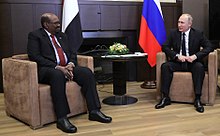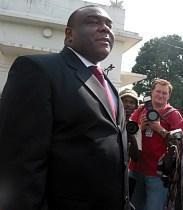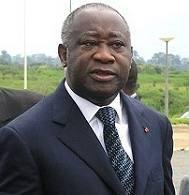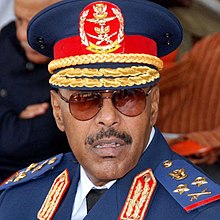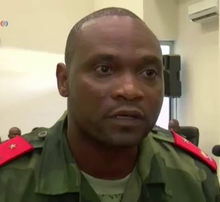List of people indicted in the International Criminal Court
An individual is indicted when a Pre-Trial Chamber issues either an arrest warrant or a summons after it finds that "there are reasonable grounds to believe that the person has committed a crime within the jurisdiction of the Court".
[41] Abu Garda was accused of being criminally responsible for murder, pillaging, and "intentionally directing attacks against personnel, installations, materials, units and vehicles involved in a peacekeeping mission".
[53] Ali was alleged to be criminally responsible for murders, deportations, rapes and other forms of sexual violence, persecutions, and other inhumane acts perpetrated by Mungiki against civilians who were perceived to be loyal to the Orange Democratic Movement (the political party of President Kibaki's rival) in the towns of Kibera, Kisumu, Naivasha, and Nakuru.
[53] Ali was summoned to appear before the Court on 8 April 2011 and the confirmation of charges hearing was held from 21 September 2011 to 5 October 2011, in conjunction with the cases against Muthaura and Uhuru Kenyatta.
[44] Banda is accused of ordering murders, pillaging, and "intentionally directing attacks against personnel, installations, materials, units and vehicles involved in a peacekeeping mission".
[39] During the Darfur conflict (specifically from April 2003 to 14 July 2008), al-Bashir, from his position as President of Sudan, is accused of implementing a government policy that used the state apparatus (the military, police, security, and Janjaweed forces) to attack Fur, Masalit, and Zaghawa populations that were perceived to be sympathetic to rebel groups.
Bemba was accused of being criminally responsible for acts of rape, torture, "outrages upon personal dignity", murder, and pillage that occurred in the towns and cities of Bangui, Bossangoa, Bossembélé, Damara, and Mongoumba from 25 October 2002 to 15 March 2003.
She said he cannot be held responsible for the actions of his men, and that the lower court "ignored significant testimonial evidence that Bemba's ability to investigate and punish crimes in the CAR was limited".
As the "Brotherly Leader and Guide of the Revolution" (the de facto head of state) and Commander of the Armed Forces of Libya he allegedly planned, in conjunction with his inner circle of advisers, a policy of violent oppression of popular uprisings in the early weeks of the Libyan civil war.
[63] He allegedly formulated a plan in response to the 2011 Tunisian and Egyptian revolutions whereby Libyan state security forces under his authority were ordered to use all means necessarily to quell public protests against his government.
These forces were allegedly aided and encouraged by Haroun to attack Fur civilian populations, specifically those in the towns of Arawala, Bindisi, Kodoom, Mukjar, and the surrounding areas.
[75] Between August 2003 and March 2004 these forces attacked Fur, Masalit, and Zaghawa civilians who were perceived to be loyal to rebel groups such as the Sudan Liberation Movement/Army and the Justice and Equality Movement.
On and around 24 February 2003, he is alleged to have ordered his forces to attack the village of Bogoro in a military operation coordinated with the Nationalist and Integrationist Front (FNI), an allied armed group composed mostly of members of the Lendu ethnicity.
[53] Kenyatta is alleged to have "had control over the Mungiki organization" and directed it to conduct murders, deportations, rapes and other forms of sexual violence, persecutions, and other inhumane acts against civilians in the towns of Kibera, Kisumu, Naivasha, and Nakuru.
[53] Kenyatta was summoned to appear before the Court on 8 April 2011 and the confirmation of charges hearing was held from 21 September 2011 to 5 October 2011, in conjunction with the cases against Mohammed Ali and Francis Muthaura.
[57] Kosgey is alleged to be criminally responsible for the murder, deportation, torture, and persecution of civilians in the towns of Kapsabet, Nandi Hills, Turbo, and the greater Eldoret area.
These attacks allegedly resulted in the persecution, murder, forcible transfer, rape, imprisonment, torture, sexual violence, and inhumane treatment of civilians, as well as the destruction of property and pillaging of villages.
[6] On 17 March 2023, ICC judges issued an arrest warrant for Maria Lvova-Belova, Russia's Children's Rights Commissioner, for war crimes committed during the Russian invasion of Ukraine.
Al-Mahdi was alleged to have been the leader of Ansar Dine's "morality brigade" during the time that it and al-Qaeda in the Islamic Maghreb controlled Timbuktu during the Northern Mali conflict.
He is alleged to have been the Executive Secretary of the Democratic Forces for the Liberation of Rwanda (FDLR), a Hutu Power rebel group fighting in the Kivu conflict, since July 2007 and the de facto President since November 2009.
[77] Mudacumura is alleged to have commanded FDLR troops which committed war crimes in the course of attacks against the Congolese armed forces in the villages of Busurungi, Kipopo, Malembe, Manje, Mianga, and the surrounding areas, in North and South Kivu Provinces in the eastern DRC between 20 January 2009 and 30 September 2010.
[53] Muthaura is allegedly criminally responsible for murders, deportations, rapes and other forms of sexual violence, persecutions, and other inhumane acts perpetrated by Mungiki forces against civilians who were perceived to be loyal to the ODM in the towns of Kibera, Kisumu, Naivasha, and Nakuru.
[53] Muthaura was summoned to appear before the court on 8 April 2011 and the confirmation of charges hearing was held from 21 September 2011 to 5 October 2011, in conjunction with the cases against Mohammed Ali and Uhuru Kenyatta.
On and around 23 February 2003, he was alleged to have led his forces into the village of Bogoro and ordered them to indiscriminately attack its civilian population in coordination with another armed group, the Front for Patriotic Resistance in Ituri (FRPI).
He is alleged to be an integral member of the policy-making leadership of the Lord's Resistance Army (LRA), an armed group which has been waging a guerrilla campaign since 1987 against the Ugandan government.
Additionally, he was also a military commander and sometime after 1 July 2002 (the date the Rome Statute entered into force) he allegedly issued "standing orders to attack and brutalise civilian populations".
[13] The Prosecutor alleges that from before July 2002 to at least December 2005 Ongwen commanded a brigade, and later a battalion, of LRA soldiers during "a widespread or systematic attack directed against the civilian population of northern Uganda.
[57] Ruto is alleged to be criminally responsible for the murder, deportation, torture, and persecution of civilians in the towns of Kapsabet, Nandi Hills, Turbo, the greater Eldoret area.
[100] Following the 2011 Libyan civil war, in which rebels overthrew the regime of Muammar Gaddafi, the victorious armed forces splintered into various groups and began battling each other for control of Libya in 2014.
[100] The Court notes that seven incidents were recorded on video and circulated by al-Saiqa's social media accounts and depicted the "exceptionally cruel, dehumanising and degrading" killing of prisoners, who were shot at close range as they were either hooded, kneeling, or have their hands restrained.
